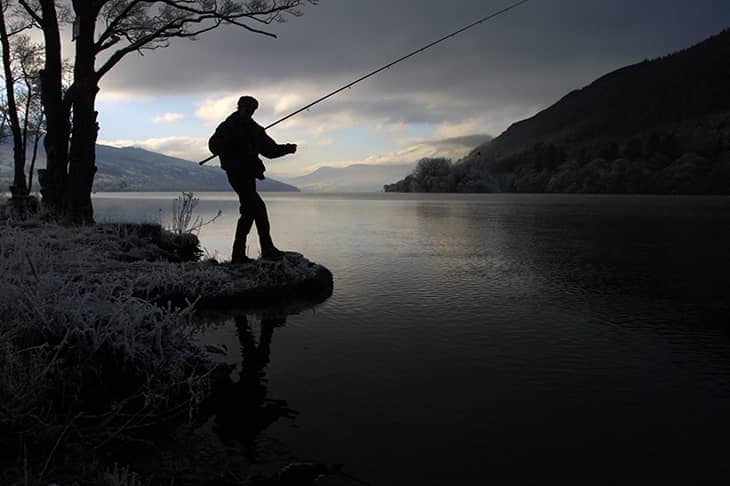Trying to catch fish with rod and line is a pursuit that, for many, goes far beyond the pleasant passing of a few leisure hours, the diverting indulgence of a hobby. It becomes little short of a reason for existence, an end for which the other bits of life are merely the means. I have never been so afflicted, being a casual sea-angler, but I look upon those who are with profound curiosity. Like deep religious faith, such zeal might sometimes look cranky, but there is much to envy too. ‘Fishing simply sent me out of my mind,’ confessed the Russian writer Sergei Aksakov. In The Lightning Thread, David Profumo traces the course of his own colourful, fish-obsessed years.
They begin in Scotland when he’s seven, with a brown trout and a worm. After the initial hook-tug and the sight of his six-ounce triumph on the river bank he feels ‘something glorious’ enter his heart. There follows a patrician bagatelle of a childhood — boarding schools, and Scottish sporting holidays peopled with the residual eccentrics of mid-20th-century Britain: the wife of a highland hotelier with ‘three bosoms’; the one-legged gillie who spoke Chinese; and the man who would surprise his guests by tobogganing downstairs on a tea tray.
In the Seychelles he fishes in ‘God’s aquarium’ for vermilion grouper, pompano and emperor sweetlips
Profumo moves up the fish ladder, progressing from worms to precisely cast flies, from loch trout to burly salmon. He sets off on a career of letters, first as a teacher, then as a novelist. In the parallel role of fishing correspondent of Country Life and the Telegraph, he is sent on many of the adventures recalled in this book. In the Seychelles he fishes in ‘God’s aquarium’ for vermilion grouper, pompano and emperor sweetlips. He goes tournament fishing in the Florida Keys and chases sporty bonefish and tarpon (which can grow to 100 lbs). On the Yucatan peninsula he angles for robalo in a pool so fish-rich he is taken there blindfolded. In Siberia, questing for salmon on the Sidorovka river, he survives a helicopter crash with three broken ribs and a deep gash to his head.
The intense and fleeting joys of angling tend to bring out the collecting impulse: not only fish photos and stock stories of victories or mishaps, but every tiny piece of equipment. At his Perthshire home, Profumo has a dedicated tackle room. Alongside the picture of a 68-salmon day and mementoes such as a piece of rotor blade from his Siberian heli-crash, he keeps 91 rods, 221 reels, 118 floats, eight pairs of waders, 13 pairs of polarised sunglasses and piles of tiny stones gathered from favourite rivers.
Over the years he has also collected a large number of adages and sayings. ‘Many men go fishing all their lives,’ mused Henry David Thoreau, ‘without knowing that it is not fish they are after.’ The Gaelic phrase rasg iasg orm — ‘a fish has caught me’ — neatly embraces the paradox that a bite at one end of the line captures the fisherman at the other. But my favourite is a manifesto on the wall of an Alaskan tinning factory: ‘We eat what we can, and we can what we can’t.’
A writerly love of words is one thing that elevates The Lightning Thread above the status of mere fishing memoir. Profumo relishes the craft of prose, shaping his sentences like casts which are often drawn deep from remote lexical pools (I am grateful to him for ‘twindle’, ‘culverkeys’ and ‘borborygmic’). The particularities of fishing require their own language, so we have lines such as these: ‘As I strip-struck the fourth rise, there came a Satcho growl from my Bogdan’; or ‘I threw it a Rootbear Charlie, it truffled in… just as an overrun blossomed from my new loop reel, and he popped the tippet’.
Beyond the swaggering yarns, the ecstatic successes and self-deprecating failures, Profumo is more reflective. Fishing in literature is an entire study in itself, and he is steeped in it. From Milton to Marvell, Walton to Coleridge, ‘rivers and fishing were commonly accepted as key paradisal motifs’. The figure of the Fisher King is a trope that can be traced from oral traditions of the Middle Ages through Melville to Eliot and Hemingway, representing the fisherly virtues of ‘dedication, persistence, patience and solitariness’, as well as more universal themes of famine and fertility and the fish-like quarry that lurk in ‘the depths of the psyche’.
But it is the bucolic pleasures, the thrill of first bites, the simple beauty of river-banks and fast-flowing burns — and the life-shaping force they all leave in the memory — that make The Lightning Thread so rewarding. For Profumo — now ‘a dishevelled grandfather with a scholarly stoop’ — angling appears often less about trying to deceive a creature from an alien habitat than about reconnecting with joys past. In this hugely enjoyable book he leaves us with the thought that, in the end, that’s what all our enthusiasms are.






Comments